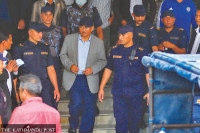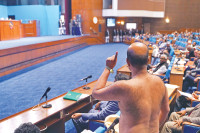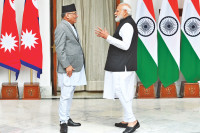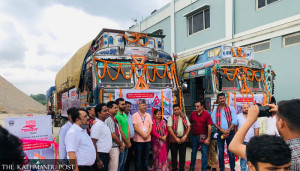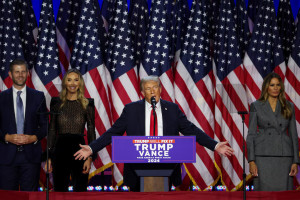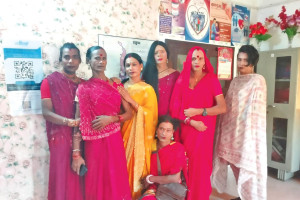Special Supplement
Former attorney general Raman Shrestha is parties’ pick for truth commission
While Shrestha himself says he will not take up the position, conflict victims too are against the parties’ decision.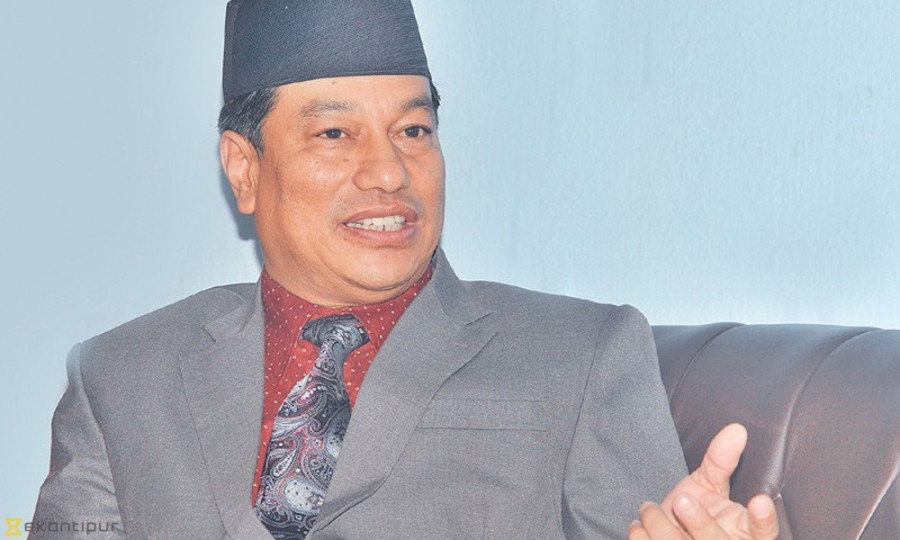
Binod Ghimire
Ignoring repeated calls for transparency, a non-partisan approach and broader consultation by conflict victims and the international community, the major political parties have decided to pick the leadership of the two transitional justice bodies under their quotas.
A meeting of the top leadership of the ruling Nepal Communist Party (NCP) and the primary opposition Nepali Congress on Wednesday agreed to pick former attorney general Raman Shrestha as the chair of the Truth and Reconciliation Commission.
Shrestha had served as the attorney general, the government’s legal advisor, during the Pushpa Kamal Dahal-led government, but had continued in his position even during Sher Bahadur Deuba’s term as prime minister.
Shrestha, however, said that though he had heard that the parties had decided on his name, he was not ready to take up the responsibility.
Transitional justice is not his area of expertise, he said.
“I am not interested in taking up the position,” Shrestha told the Post. “I will speak to party leaders once I receive their proposal.”
Multiple people familiar with the developments told the Post that the parties have agreed to make efforts to convince Surya Dhungel, advisor to former President Ram Baran Yadav, to lead the Commission of Investigation on Enforced Disappeared Persons.
Dhungel, who was the Nepali Congress’ pick for the Truth Commission, has refused to lead the Disappearance Commission, according to a Nepali Congress leader.
“If Dhungel refuses, Sher Bahadur KC could be appointed to the Disappearance Commission,” the leader told the Post on condition of anonymity.
KC is the former chairman of Nepal Bar Association, the umbrella body of lawyers in the country.
The two transitional justice commissions have remained without officials since April 14, after the government relieved them of their duties through an amendment to the applicable law.
Bargaining between the ruling and opposition parties to pick their own people for the Truth Commission had delayed the appointment process.
Leaders, however, reached an agreement after the Nepali Congress agreed to settle for the leadership of the Disappearance Commission if Shrestha is appointed chairman of the Truth Commission.
“Nepali Congress President Deuba was ready to compromise on Shrestha’s name,” said a ruling party leader.
The Congress had earlier proposed Dhungel for the Truth Commission. But since the quota for the Truth Commission went to the ruling communist party, Dhungel was asked to lead the Disappearance Commission instead.
At least half a dozen leaders and officials the Post spoke to said that Madhabi Bhatta and Shree Krishna Subedi were likely to be reappointed to the Truth Commission as members.
The government on March 25 had formed a committee under former chief justice Om Prakash Mishra to recommend a total of 10 names—two chairpersons and four members each—for the two commissions.
After the parties agree on the names, the Mishra-led committee will publish a list of candidates and issue a public call for complaints, if any.
“It will take some time for the commissions to take full shape. Appointments are possible only after Prime Minister KP Sharma Oli returns from treatment in Singapore,” Subas Nembang, a ruling party member who was part of the negotiation process, told the Post.
Nembang, however, said that selecting officials for the commissions is the prerogative of the Mishra-led committee. The two parties, in Wednesday’s meeting, also decided to finalise the amendment to the existing Enforced Disappearances Enquiry, Truth and Reconciliation Commission Act after consultation with the concerned parties in all the provinces and the Capital, said Nembang.
“We have heard that the recommendation committee will be finalising the names very soon. Therefore, an amendment to the existing Act is an immediate requirement,” he said.
Amid growing concerns from the international community, the government, two weeks ago, had written to the Office of the United Nations High Commissioner for Human Rights, saying that the appointment process would be transparent.
“The High Commissioner’s Office has asked us if the government’s claim is true,” Janak Raut, general secretary of the Conflict Victims’ Common Platform, told the Post. “The government has tried to keep the international community in the dark.”
Victims of the decade-long Maoist “people’s war” have said they won't accept any decision that is taken without consulting with them.
Bhagi Ram Chaudhari, chairman of the platform, told the Post that they would reject any appointments that are made without their consent.
“We have been saying that an amendment to the Act is necessary before any appointment to the commissions. We won't accept any decision that is imposed,” Chaudhari told the Post.
More than a decade after the signing of the Comprehensive Peace Agreement, the transitional justice process remains stalled.
The government has yet to amend the Transitional Justice Act in line with a Supreme Court ruling that struck down half a dozen provisions, including one that paved the way for amnesty for those guilty of serious human rights violations. The international community has long been demanding that Nepal amend the Act in line with the Supreme Court’s order and Nepal’s international obligations.




 14.12°C Kathmandu
14.12°C Kathmandu


